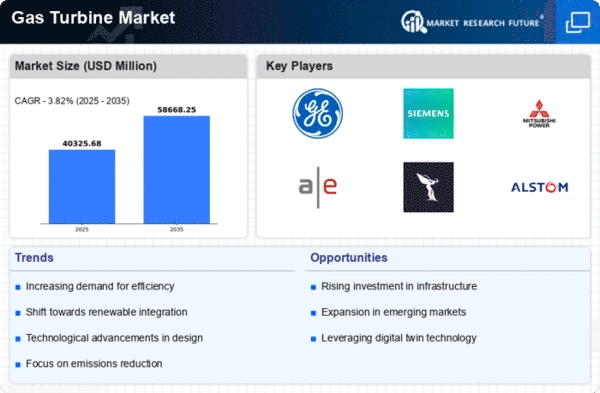Top Industry Leaders in the Gas Turbine Market

*Disclaimer: List of key companies in no particular order
The Global Gas Turbine Market is characterized by its dynamic and competitive nature, featuring both established industry leaders and innovative newcomers striving to disrupt the existing market dynamics. This analysis provides an in-depth examination of the competitive landscape, focusing on key players, their strategies, market share influences, emerging trends, and the overall competitive scenario.
Key Players and Strategic Approaches:
General Electric (GE): General Electric stands as a dominant force in the gas turbine market, offering a diverse portfolio across various capacities and applications. GE prioritizes technological advancements, delivering highly efficient and reliable solutions. The company actively engages in mergers and acquisitions to broaden its reach and incorporate new technologies.
Siemens Energy: Siemens Energy, a close competitor to GE, places a strong emphasis on innovation, particularly in the realm of combined cycle power plants. The company concentrates on digitalization solutions, providing monitoring and optimization services to enhance overall performance and efficiency.
Mitsubishi Hitachi Power Systems (MHPS): MHPS, a major player in the Asia Pacific region, offers a varied range of gas turbines, including the highly efficient and fuel-flexible J-series. Actively expanding its presence globally, MHPS is focusing on regions such as Africa and the Middle East.
Baker Hughes: Baker Hughes targets niche markets with a focus on smaller and modular gas turbines, particularly in distributed generation and oil and gas applications. The company invests in digital solutions and remote monitoring capabilities to enhance its service offerings.
Solar Turbines: As a subsidiary of Caterpillar, Solar Turbines specializes in small and medium-sized industrial gas turbines. Their emphasis on reliability and low maintenance requirements makes their products suitable for remote locations and challenging environments.
Market Share Analysis Factors:
Several factors contribute to the analysis of market share in the gas turbine industry:
- Product Portfolio: The breadth and depth of a company's gas turbine offerings across different capacities and technologies play a crucial role.
- Regional Presence: A strong presence in key growth markets, such as Asia Pacific and the Middle East, significantly impacts market share.
- Technological Advancements: Continuous innovation in developing efficient and low-emission gas turbines is a key driver of market share.
- Service Capabilities: The presence of a comprehensive after-sales service network and expertise in maintenance and optimization is crucial.
- Financial Strength: Robust financial resources enable companies to invest in research and development, expand their reach, and acquire new technologies.
Emerging Trends in the Gas Turbine Market:
The gas turbine market is experiencing several noteworthy trends:
- Growing Demand for Cleaner Energy: Increasing environmental concerns are driving the demand for gas turbine technologies with lower emissions and higher fuel flexibility.
- Rise of Distributed Generation: Decentralized power generation solutions using smaller and modular gas turbines are gaining traction.
- Digitalization and Data Analytics: Companies are integrating advanced analytics and digital solutions to optimize gas turbine performance and predict maintenance needs.
- Hybrid Power Generation: Combining gas turbines with renewable energy sources like solar and wind is becoming increasingly prevalent.
- Focus on Efficiency and Fuel Flexibility: Continuous efforts are being made to improve gas turbine efficiency and develop solutions that can operate on various fuels.
Overall Competitive Scenario and Strategies for Key Players:
The gas turbine market is expected to continue its steady growth, driven by increasing power demand, technological advancements, and a shift towards cleaner energy technologies. While established players like GE and Siemens Energy dominate the competitive landscape, new entrants are introducing innovative solutions.
To maintain their positions, key players should:
- Focus on continuous innovation in developing efficient and clean gas turbine technologies.
- Expand their regional presence, particularly in emerging markets.
- Invest in digitalization and data analytics to offer advanced service solutions.
- Develop hybrid power generation solutions by integrating gas turbines with renewable energy sources.
- Form strategic partnerships with other companies to expand capabilities and access new markets.
Industry Developments and Latest Updates:
General Electric (U.S.): Nov 22, 2023: GE and Saudi Aramco sign MoU to advance hydrogen turbine technology for power generation (Source: GE Press Release).
Siemens (Germany): Dec 12, 2023: Siemens Energy unveils SGT5-8000H hydrogen-ready gas turbine (Source: Siemens Energy website).
Mitsubishi Heavy Industries Ltd. (Japan): Nov 23, 2023: MHI and EDF Renewables partner on hybrid wind-hydro-battery project in France (Source: MHI website).
Alstom S.A (France): Dec 05, 2023: Alstom signs €500M contract for gas turbine power plant in Turkey (Source: Alstom website).
Kawasaki Heavy Industries Ltd. (Japan): Oct 26, 2023: Kawasaki successfully tests the world's first hydrogen-fired 1,700°C-class gas turbine (Source: Kawasaki website).

